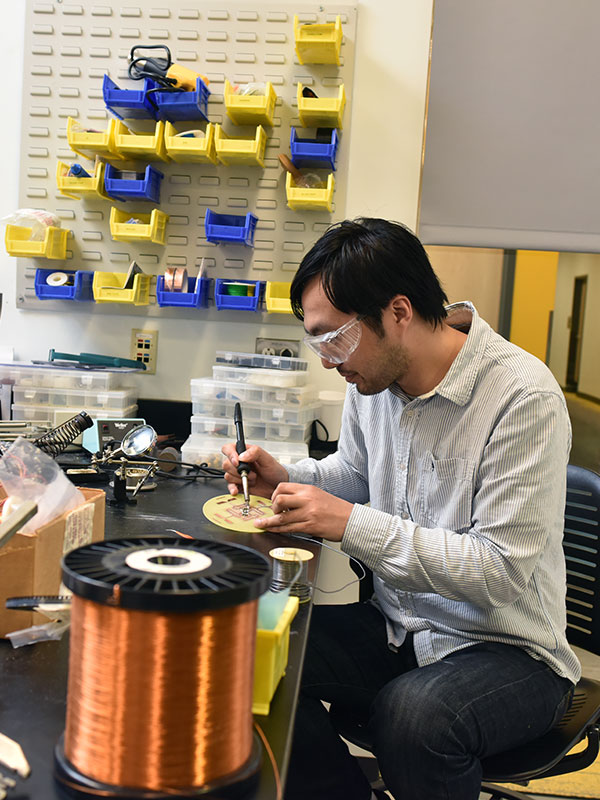Doctorate in Electrical Engineering

The graduate programs in electrical engineering from Drexel Engineering engage you in learning and research at the forefront of electrical engineering. Students graduate prepared for careers in academia, industry or at national research labs.
What is an Electrical Engineering PhD program?
An electrical engineering doctoral program prepares you take on emerging topics in design, construction and use of components, devices and systems that utilize electronics and magnetism and will prepare you to contribute to advances in this rapidly evolving discipline. Electrical engineers have impact on public welfare and safety, as well as on health and healthcare, the environment, quality of life, transportation, computing, and leisure. You will investigate ideas that seek to address challenges in industry or in society that can be impacted by electronic applications.
The PhD program in Electrical Engineering has the following major aims:
- Deliver education covering the breadth and depth of the most current and advanced knowledge in electrical engineering through in-depth study of the chosen field of specialization.
- Develop top research capabilities through discovery, faculty guidance and research training.
- Prepare leaders in the field for careers in academia, research and industry.
Delivery
- On-campus
- Full-time
- The PhD in Electrical Engineering will take four to six years to complete on a full-time basis.
Why choose Drexel for your PhD in Electrical Engineering?
As a Carnegie R1 research institution, Drexel is in the top tier of research output and one of only 34 US institutions with that designation. Through rigorous analysis and exploration, Drexel’s doctoral degree program in electrical engineering deepens knowledge of the discipline, engineering design and implementation, and the considerations unique to the field. Students emerge prepared to take on the demands of industry, research, or academia in electrical engineering and its related disciplines.

The Electrical and Computer Engineering (ECE) Department has you working side-by-side with top researchers in the field while becoming an expert in your dissertation topic. Strengths include machine learning, wireless, biomedical imaging, robotics, wearable electronics, Internet of Things, cybersecurity, telecommunications and nanotechnology.
The ECE faculty direct thriving research that supports PhD students and postdoctoral researchers in a variety of activities. In 2021 the department has received more than $3.5 million dollars in awards and nearly $3 million in research expenditures. Drexel PhD students shape the field through pioneering research that often leads to commercialization and entrepreneurship. Just in 2021 alone, the College of Engineering faculty have garnered 16 US patents, three license agreements and has produced a new startup company.
The Wireless Systems Lab uses innovation and interdisciplinary collaboration to find new ways that wireless can be used.
Read More
Faculty
Faculty in are experts with industry experience or are at the forefront of research and teaching. Our ECE faculty have garnered many awards and numerous notable achievements.
Kapil R. Dandekar
E. Warren Colehower Chair Professor
Associate Dean for Enrollment Management and Graduate Education
View Full Bio
Youngmoo Kim
Professor
Director, Expressive and Creative Interactive Technologies (ExCITe) Center
View Full Bio
Philadelphia
The city of Philadelphia and the surrounding metro area are home to multiple industrial research and production facilities that attract advanced electrical engineering talent. Learn more.
Curriculum and Requirements
Both in research and in curriculum, the Drexel electrical engineering PhD program emphasizes a combination of fundamentals with topical specialization and interdisciplinary training.
At least 90 credits are required for the PhD degree. You will choose a doctoral thesis topic after consultation with the faculty early in the program. An oral thesis presentation and defense are scheduled at the completion of the thesis work.
Due to the widely varied nature of research in the field of electrical and computer engineering, the ECE Department does not dictate completion of specific courses. Rather, doctoral students are expected to construct, with the assistance of their supervising professor(s) and the graduate advisors, a plan of study that outlines the coursework that the student intends to complete that will help support the research endeavors being undertaken towards degree completion.
An MS degree is not a prerequisite for the PhD degree but does count for 45 quarter credits toward the 90-quarter credit requirement.
Graduate advisors will guide your course selection and scheduling of core and elective courses. Visit the Drexel Catalog for more information and sample study plans for areas of specialization or learn more about our admissions requirements.
Research
All students in the Electrical Engineering PhD program engage in research as part of their degree. Candidates are encouraged to base their thesis on some aspect of faculty research.
The ECE department research competencies support research themes of energy, sustainability and health and medicine and subjects directly linked to solving present-day societal challenges.
Our labs house research conducted by our world-renowned faculty, funded by the U.S. Department of Defense, Transportation and Health and Human Services, Commerce and Homeland Security as well as with many notable industry partners.
Current research in electrical engineering covers areas such as:
- Adaptive signal processing
- Alternative energy
- Biomedical imaging
- Circuit design
- Computer architecture
- Controls and robotics
- Cybersecurity
- Digital signals processing
- Electro optics
- Entertainment engineering
- Financial engineering
- Flexible electronics
- Image processing
- Information theory
- Machine learning
- Magnet sensors
- Mathematical modeling of networks
- Microwave systems
- Nanoelectronics
- Networking
- Nuclear engineering
- Power engineering and smart grid technology
- RF and antenna design
- Telecommunications
- VLSI
- Web science
- Wireless communications
Visit research areas for more about other research activity at the College of Engineering.
Funding Opportunities
The vast majority of incoming graduate students are funded by research assistantships, so we encourage you to contact faculty whose research interests you.
In addition, you may wish to investigate the following funding opportunities:
Apply Now Graduate Admissions Department Page